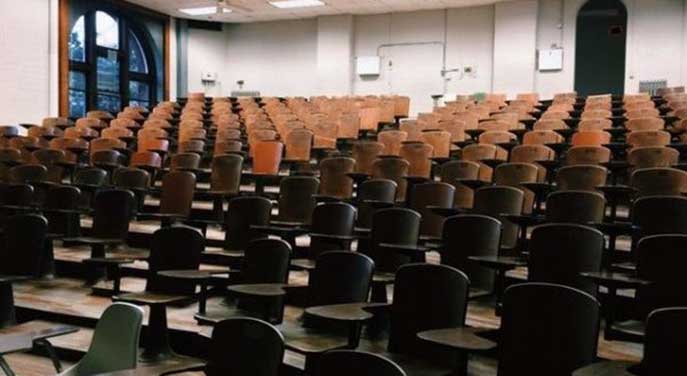The Canadian Academics for Covid Ethics (CA4CE) is a group of researchers and scholars from fields spanning the natural and social sciences and humanities. It is concerned with the mismanagement of the ongoing SARS-CoV-2 pandemic response in Canada and around the world.
The following commentary was written by Drs. Kevin Cheung, Claus Rinner, Laurent Leduc, Jeffrey Graham, Candice Chow, Philip Britz-McKibbin, Anton de Ruiter, Alexander Andree, Claudia Chaufan, Paul Bali, David M. Haskell, Robert Price, Daphene Francis, Julien Beillard.
Last week, many colleges and universities in Ontario announced that classes will be held online again during the first several weeks of the winter semester. A return to campuses will not happen until some time between mid-January and late February, pending further delays.
The irony is that our post-secondary institutions had made grandiose pronouncements throughout the fall term about a full return to in-person learning in January 2022. To make that happen, they created punishing mandatory vaccination policies that led to non-compliant staff and faculty being threatened with, or already placed on, unpaid leaves and even fired, and non-compliant students barred from campuses and de-enrolled from winter courses.
In the process, our much-celebrated principles of equity, diversity, and inclusion were trampled; established, generous accommodation procedures based on fundamental human rights were obliterated; and valid medical indications against vaccination were recklessly disregarded. In addition, other jurisdictions recognize robust and durable natural immunity from COVID-19 recovery, but not so Canada.
Many of us had been skeptical about the optimistic timing of a full return to campuses that would coincide with the annual peak of respiratory illness in our latitudes. And sure enough, the dreaded Omicron variant of SARS-CoV-2 reared its ugly head in the media narrative du jour and forced the hands of higher-education administrators.
It is apparent that the mandatory vaccination policies have done practically nothing for a return to any semblance of normal, despite the posted compliance rates in the 90 percent range at most institutions. And the same strategy of closing campuses before anyone was vaccinated is being deployed again.
To add insult to injury, the message now is to get a booster before returning to campus, despite lacking evidence of meaningful benefit in mitigating the spread of the Omicron variant. Do the powers that be really still believe that we can jab our way out of the current situation with leaky vaccines when this approach has already failed? As they say, “the definition of insanity is doing the same thing over and over again and expecting a different result.” To see institutions of higher education perform this stunt is particularly sobering and reflects a systemic policy failure.
Speaking of injury, close to one-half of Ontario’s post-secondary student population fall into the category of 18- to 24-year-old males. These young adults, hardly susceptible to severe COVID-19, are subject to a serious risk of heart inflammation from the mRNA injections. In September, the Moderna product was discontinued for this age group because of a one in 5,000 rate of myocarditis. But after three months of using only Pfizer/BioNTech, the latest data from Public Health Ontario as of 12 December 2021 report a 193.6 in one million myocarditis/pericarditis risk from the second dose alone. That translates to one in 5,165 and presents virtually no safety improvement for young men.
 In addition, we personally know of several students with unreported cases of sudden and unexpected heart problems following vaccination and wonder how much more harm the vaccine mandates have already inflicted on campus communities. How will boosters further add to these risks, given the tendency for underreporting with passive pharmacovigilance in Ontario?
In addition, we personally know of several students with unreported cases of sudden and unexpected heart problems following vaccination and wonder how much more harm the vaccine mandates have already inflicted on campus communities. How will boosters further add to these risks, given the tendency for underreporting with passive pharmacovigilance in Ontario?
It is disheartening that students will bear the brunt of these abrupt, life-changing decisions. Many of them were full of hope to go back to campus life. They got vaccinated, arguably under social pressure and administrative coercion rather than free choice. They planned their living and work arrangements based on their institutions’ pompous claims. But now, they are told that the winter semester will start online, and the likelihood of a full return in February is anyone’s guess.
Higher education is about people. Students, staff, and faculty members need to be respectfully treated as human beings with a life to live, not an on-off switch in a circuit breaker. With break-through cases on the rise, the vaccine mandates will have minimal impact on campus safety but are sure to hurt those who cannot comply for a variety of legitimate reasons.
The opinions expressed by our columnists and contributors are theirs alone and do not inherently or expressly reflect the views of our publication.
© Troy Media
Troy Media is an editorial content provider to media outlets and its own hosted community news outlets across Canada.


